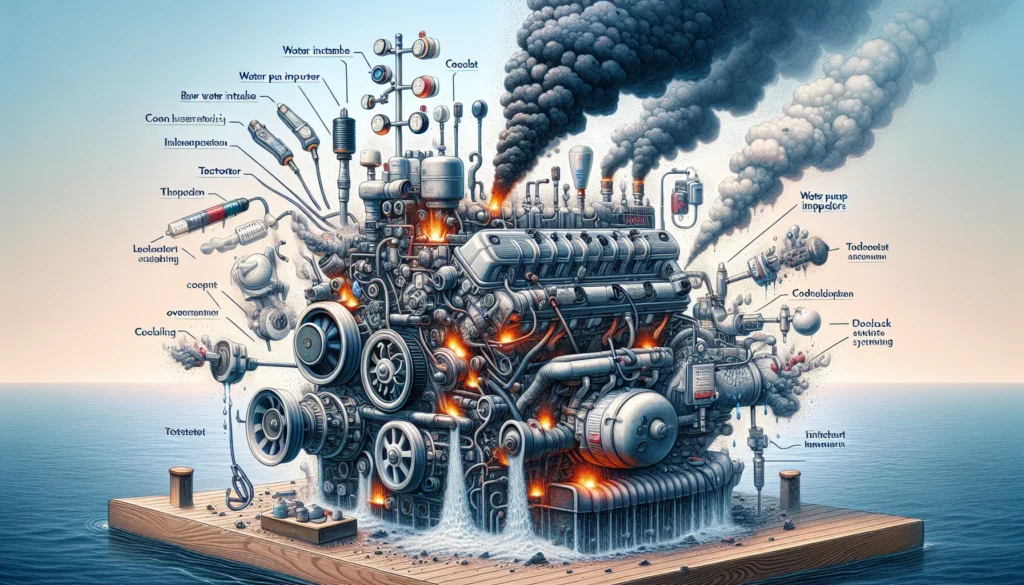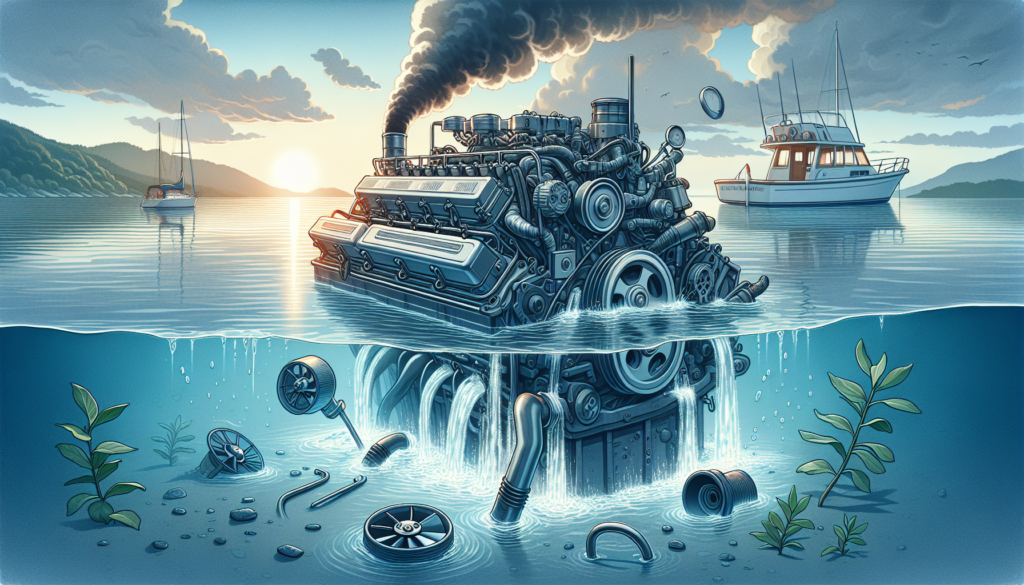Navigating the open waters can be an enthralling experience until your boat engine starts overheating, throwing off your entire plan. With the winds in your hair and sea beneath you, the last thing you need is an engine acting up. In “Boat Engine Overheating: Causes and Solutions,” you’ll find an in-depth look at the perplexing issue that haunts many boating enthusiasts. The article will equip you with the knowledge of the reasons behind this frequent problem and provide you with quality solutions to handle these situations better in the future. An overheating boat engine shouldn’t stand between you and your ocean adventures. So, get ready to gain valuable insights that will aid you in maintaining the good health of your boat engine.

Understanding Overheating
What is overheating?
Overheating is a term used to refer to a situation where your boat engine gets so hot it starts to harm itself and even potentially the boat’s other systems. Just like in your body, when your boat’s engine temperature rises above the norm, it indicates that something might be wrong.
How engines cool down
Under normal operating conditions, your boat engine cools down through a process called heat exchange. The engine generates heat as it operates, and to keep it from getting too hot, a cooling system circulates a coolant fluid through the engine’s parts. This fluid absorbs the heat and then passes it along to the surrounding environment, which is typically the water body in which your boat is operating.
What happens when an engine overheats
When an engine overheats, it can lead to a series of problems. Besides its common tendency to stop running, overheating can cause physical damage to the engine parts. It can lead to the warping of parts, head gasket failure, and internal engine damages such as a seized piston.
Common Causes of Overheating
Insufficient coolant
One of the most common causes of overheating is insufficient coolant. Coolant is the liquid that absorbs heat from your engine and carries it away. Without enough coolant, or if the coolant is not properly circulating, too much heat build-up can result causing the engine to overheat.
Faulty water pump
The water pump plays a crucial role in your boat engine’s cooling system. It circulates the coolant throughout the engine. If the pump becomes faulty or fails, the coolant circulation gets hindered, resulting in the engine overheating.
Engine oil problems
Engine oil is another critical factor in cooling your boat engine. It lubricates, cools, and cleans the engine. Lack of oil or use of the wrong grade can contribute to the engine overheating because it increases friction in moving parts which subsequently increases heat.
Restricted air flow
Air flow is essential for cooling your boat engine. The air helps dissipate heat from the engine. If there’s a restriction in air flow, it can cause the heat to build up, thus leading to overheating.
Operation under load
Operating your boat engine under heavy load can also cause overheating. When more power is demanded from your engine than it can handle, it puts stress on the engine resulting in creating excessive heat and potentially leading to overheating.
Problems with the thermostat
The thermostat regulates the temperature of the engine by controlling the flow of the coolant. If the thermostat fails or gets stuck, it can disrupt the flow of coolant, causing your boat engine to overheat.
Impacts of Continued Overheating
Engine wear and damage
A major impact of continued overheating is accelerated wear and damage to your boat engine. The high temperatures can warp engine parts, cause bearing failures, and even lead to a cracked engine block or head gasket failure.
Reduced engine performance
Extended periods of overheating can significantly reduce your engine’s performance. Overheating can lead to loss of power, reduced fuel efficiency, decreased engine lifespan and ultimately, complete engine failure.
Potential safety risks
Overheating also poses potential safety risks. A severely overheated engine is prone to catching fire, which poses a risk to not just your boat but also the lives aboard.

Signs of an Overheating Boat
Rising temperature gauge
One of the first signs you might notice of an overheating engine is your temperature gauge rising above its normal operating level. It’s important to regularly monitor your temperature gauge to ensure it stays within a healthy range.
Loss of engine power
If your engine is slowly losing power or if it feels sluggish, it might be a symptom of overheating. Overheating can cause your engine to work less efficiently, leading to noticeable loss of power.
Steam or smoke from the engine
Steam or smoke emanating from your engine is a clear sign of overheating. If you notice steam or smoke, it’s a sign that your engine is in immediate danger and you should turn it off right away.
Unusual or loud engine noises
Overheating can cause parts of your engine to expand and contract rapidly, leading to unusual or loud engine noises. These may sound like knocking, rattling or pinging.
Immediate Steps When Overheating Occurs
Shutting down the engine
When you notice your boat engine is overheating, immediately shut down the engine. This will help to stop the temperature from increasing and avoid further damage.
Allowing the engine to cool
After you’ve shut down the engine, give it time to cool down. Opening the engine cover can help speed up the cooling process but be cautious about touching any parts as they can be very hot.
Checking for visible issues
Once the engine has cooled down, you can begin checking for visible issues. Look for leaks, damaged hoses, low coolant levels, or anything unusual that could be causing the overheating.
Seeking professional help if needed
If the cause of overheating is not visible or if you’re unsure of what to do, it’s time to call for professional help. It’s always better to be safe than sorry when dealing with potentially serious engine problems.
Inspection of the Cooling System
What is a cooling system?
The cooling system in a boat engine is the system responsible for keeping the engine temperature within its operation limits. It does this by circulating coolant to absorb excessive heat and dissipating it into the surroundings.
Importance of a functional cooling system
A functional cooling system is vital in a boat engine. It ensures that the engine operates without overheating, thus optimizing its performance and longevity.
Checking coolant levels
Regularly checking your coolant levels is a crucial part of maintaining a functional cooling system. Too little coolant can lead to overheating, whilst too much coolant can lead to other problems such as coolant leakage.
Inspecting the radiator and hoses
You should regularly inspect your engine’s radiator and hoses for any signs of cracks or leaks. Damaged hoses or a failing radiator can lead to coolant leaks, thereby reducing the effectiveness of the cooling system.
Examining the water pump and thermostat
Regularly examine your boat’s water pump and thermostat for any signs of damage or failure. These are critical components of your cooling system and if they fail, your engine is at risk of overheating.
Maintaining the Boat Engine
Regular engine checks
Regular checks of your boat engine can help prevent overheating issues. These checks should include aspects such as coolant levels, oil levels and checking the condition of belts and hoses.
Regular oil changes
The engine oil is responsible for cooling and lubricating your boat’s engine, and should be changed regularly. Dirty or old oil can increase the chances of engine overheating.
Maintaining the cooling system
Just as mentioned earlier, maintaining the boat’s cooling system is a critical aspect of preventing overheating. This involves regular coolant changes, checking and replacing hoses and belts, and servicing the water pump and thermostat.
Ensuring unrestricted air flow
To ensure your engine is able to dissipate heat efficiently, ensure air flow isn’t restricted through the engine compartment. Regularly clean out leaves and any other debris that could obstruct air flow.
Avoiding engine overloading
Overloading your boat engine can cause overheating. Ensure you’re not over-demanding from your engine and regularly check your propeller size and condition to avoid engine stress.
Repair and Replacement Considerations
When to seek professional help
It’s crucial to understand when professional help is needed. If your boat’s engine keeps overheating despite your efforts or if you’re unsure of what to do, it’s time to seek professional help.
Cost factors for repair and replacement
The cost of repair and replacement depends on various factors. These include the problem at hand, the costs of parts needed, and the labor rates of the mechanic. While repair might sound more affordable short-term, sometimes the cost of continuous repairs may surpass that of a replacement.
When to replace over repairing
While repairing seems like the go-to solution when problems present themselves, there are scenarios where replacement might be more beneficial. Cases such as when the cost of repair is more than half the cost of a new engine or when the engine continually overheats despite repairs, replacement should be considered.
Preventing Overheating
Importance of preventive maintenance
Preventive maintenance is a crucial aspect of preventing overheating. It involves performing maintenance checks, changing oil and coolant regularly, and ensuring the cooling system is working perfectly. In essence, you’re stopping potential problems before they escalate into overheating.
Staying vigilant to changes in engine performance
Keeping a keen eye on your engine performance is another way to prevent overheating. Changes in your boat engine performance can help inform you that something is off and needs attention before it evolves into engine overheating.
Adhering to manufacturer’s instructions
Your engine’s manufacturer knows best on how to keep your boat engine at its best. Adhering to the specific maintenance schedule and usage instructions outlined by your engine’s manufacturer is a great way of preventing overheating.
Technological Developments and Overheating
Improvements in engine design
Technological advancements have led to improvements in boat engine design, making them more efficient and less likely to overheat. These enhancements involve upgraded internal components, better materials, and advanced engineering designs that enhance the heat transfer process.
Advanced cooling systems
Technological developments have also resulted in advanced cooling systems. These systems are more robust, reliable, and efficient in maintaining a healthy engine temperature.
Boat engine monitoring technology
With the advent of boat engine monitoring technology, it’s now easier to keep track of your engine’s performance. Some of these technologies provide real-time data on engine health, including temperature, thereby ensuring that you can detect and rectify overheating issues before they become significant.

